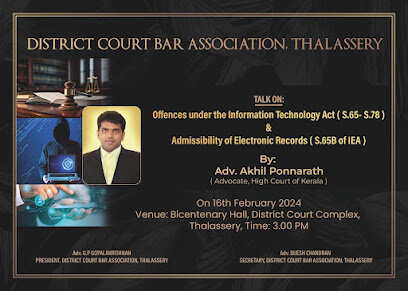Best Divorce & Separation Lawyers in Kannur
Share your needs with us, get contacted by law firms.
Free. Takes 2 min.
Free Guide to Hiring a Family Lawyer
List of the best lawyers in Kannur, India
India Divorce & Separation Legal Questions answered by Lawyers
Browse our 2 legal questions about Divorce & Separation in India and read the lawyer answers, or ask your own questions for free.
- Married life issue.
- How to get divorce. What is the criteria.
-
Lawyer answer by MAH&CO.
Thank you for your question.As an experienced family lawyer with decades of practice in divorce, khula, and marital dispute resolution, I can guide you through the legal process of obtaining a divorce in Pakistan. Divorce Procedure & Criteria (for Men):Under...
Read full answer - It is possible to do a marriage null and void?
- I’m French and live in France. I married with an Indian in Hathras in India. He lives in Delhi in Tagore garden. He cheated with me and he was interested by visa and money. He created a fake wedding card, made me sign some documents to get the registered marriage... Read more →
-
Lawyer answer by LAW CHAMBER OF ADVOCATE RAJVEER SINGH
BASED ON THE INFORMATION PROVIDED BY YOU, THIS MARRIAGE IS VOID AB INITIO AND IT CAN BE DECLARED VOID BY THE INDIAN FAMILY COURTAs you mentioned, since the marriage was conducted under the Hindu Marriage Act without a valid religious...
Read full answer
India Divorce & Separation Legal Articles
Browse our 1 legal article about Divorce & Separation in India written by expert lawyers.
- A Layman’s Guide to a Landmark Ruling on Rights of Divorced Muslim Women
- The Supreme Court of India, on 2 December 2025, delivered a judgment that carries deep significance for Muslim women across the country. The case, Rousanara Begum v. S.K. Salahuddin (2025 INSC 1375) SC Judgment of 2Dec2025, concerned a simple yet socially important question:When gifts such as cash, gold, or household... Read more →
About Divorce & Separation Law in Kannur, India
Divorce and separation laws in Kannur, a district in Kerala, India, are governed by the broader national laws of India, primarily based on personal laws related to different religions (such as Hindu, Muslim, Christian, and Parsi Laws) as well as the Special Marriage Act for inter-religious marriages. The process includes both judicial separation and legal divorce, with provisions for both mutual consent and contested divorces. Courts in Kannur-including the Family Court-handle these matters, ensuring a legal resolution for couples who decide to end their marital relationship or live separately.
Why You May Need a Lawyer
Divorce and separation can be emotionally and legally complex. A qualified lawyer specializing in family law can help you in various situations, such as:
- Filing for divorce (mutual consent or contested)
- Resolving child custody and visitation issues
- Negotiating alimony/maintenance or child support
- Managing proceedings involving domestic violence or abuse
- Division and settlement of jointly owned property and assets
- Interpreting applicable religious and secular laws
- Ensuring all legal documents and representations are properly managed
- Appealing or responding to court decisions
Legal assistance ensures your rights are protected and helps achieve a fair outcome.
Local Laws Overview
Divorce and separation in Kannur operate under several national and state laws, applied according to the spouses' religious affiliation or mode of marriage:
- Hindu Marriage Act, 1955: Applies to Hindus, Buddhists, Jains, and Sikhs. Provides grounds for divorce such as cruelty, desertion, adultery, etc.
- Muslim Personal Law (Shariat) Application Act, 1937: Divorce among Muslims can occur through methods like talaq, khula, or judicial decree (Faskh).
- Indian Divorce Act, 1869: Governs divorce among Christians, outlining grounds and procedures.
- Parsi Marriage and Divorce Act, 1936: Applies to Parsis in India.
- Special Marriage Act, 1954: Facilitates civil marriage and divorce irrespective of religion, frequently used for inter-faith marriages.
In Kerala, and thus in Kannur, matters such as property rights, custody of children, and maintenance are adjudicated by Family Courts. Mediation is often encouraged before litigation. Kerala also recognizes the rights of women and children, ensuring fair treatment in matters of alimony and custody.
Frequently Asked Questions
What are the different ways to obtain a divorce in Kannur?
Divorce can be obtained by mutual consent (both spouses agree) or through a contested process if one party does not consent. The applicable process will depend on your religion and specific situation.
How long does it take to get a divorce?
A mutual consent divorce typically takes 6 to 18 months, depending on the court’s schedule. Contested divorces may take longer, sometimes several years, due to hearings, evidence, and appeals.
What is judicial separation, and how is it different from divorce?
Judicial separation allows spouses to live apart without legally ending the marriage. This can be a step before divorce and provides time for possible reconciliation.
How are child custody and visitation decided?
Child custody is decided based on the best interests of the child. Both parents can request custody, and courts may grant joint or sole custody, along with visitation rights for the non-custodial parent.
Are women entitled to maintenance or alimony after divorce?
Yes, Indian law provides financial support (maintenance/alimony) to a spouse (typically the wife) unable to support herself after separation or divorce. The amount is determined based on the incomes and needs of both parties.
Can I get a divorce if my spouse is not willing?
Yes, you can file for a contested divorce if your spouse does not agree, on specific legal grounds such as cruelty, desertion, adultery, etc.
Do I need to live separately before applying for divorce?
For mutual consent divorces, the law usually requires the spouses to have lived separately for at least one year before filing. The requirement can vary based on the applicable law.
What happens to joint property after divorce?
Assets and properties are typically divided either through mutual agreement or as directed by the court, often considering the contributions and welfare of both parties.
Is mediation required before filing for divorce in Kannur?
Family Courts in Kerala encourage mediation and reconciliation. In many cases, parties are required to undergo mediation before further litigation proceeds.
How can I protect myself from domestic violence during separation or divorce?
Indian law provides strong protections under the Protection of Women from Domestic Violence Act, 2005. You can approach the police, women's helplines, or the courts for restraining orders and relief.
Additional Resources
There are several resources that individuals seeking legal advice on divorce and separation in Kannur can turn to:
- Family Court, Kannur: Handles divorce, separation, custody, and related matters.
- Kerala State Legal Services Authority (KELSA): Provides legal aid and mediation services.
- Women’s Rights Organizations: Offer support and legal counseling to women facing domestic issues.
- District Bar Association, Kannur: Directory of qualified family law lawyers.
- Online Government Portals: For information on legal processes and forms relevant to family law.
Next Steps
If you are considering or facing divorce or separation in Kannur, here’s how to proceed:
- Consult a qualified family lawyer in Kannur to understand your rights and options.
- Gather all relevant documents-such as marriage certificate, identity proofs, address proofs, evidence of grounds for divorce, property documents, and details about children (if any).
- Explore mediation for amicable settlements, especially if children or joint property are involved.
- File the appropriate petition in the Family Court with your lawyer’s assistance.
- Participate in all court proceedings and mediation sessions as required.
- Follow legal advice for your safety (especially in cases involving domestic violence).
- Utilize support organizations for counseling and legal information.
Taking these steps with the guidance of a competent legal professional can help you manage the challenges of divorce or separation and safeguard your interests.
Lawzana helps you find the best lawyers and law firms in Kannur through a curated and pre-screened list of qualified legal professionals. Our platform offers rankings and detailed profiles of attorneys and law firms, allowing you to compare based on practice areas, including Divorce & Separation, experience, and client feedback.
Each profile includes a description of the firm's areas of practice, client reviews, team members and partners, year of establishment, spoken languages, office locations, contact information, social media presence, and any published articles or resources. Most firms on our platform speak English and are experienced in both local and international legal matters.
Get a quote from top-rated law firms in Kannur, India — quickly, securely, and without unnecessary hassle.
Disclaimer:
The information provided on this page is for general informational purposes only and does not constitute legal advice. While we strive to ensure the accuracy and relevance of the content, legal information may change over time, and interpretations of the law can vary. You should always consult with a qualified legal professional for advice specific to your situation.
We disclaim all liability for actions taken or not taken based on the content of this page. If you believe any information is incorrect or outdated, please contact us, and we will review and update it where appropriate.













